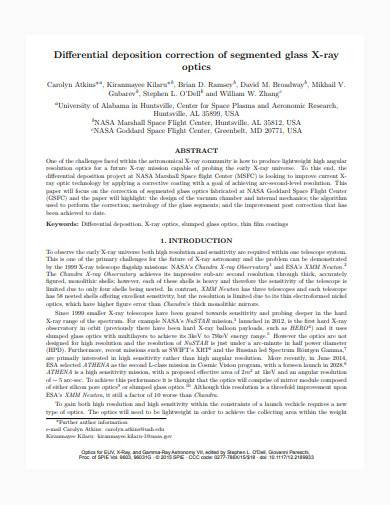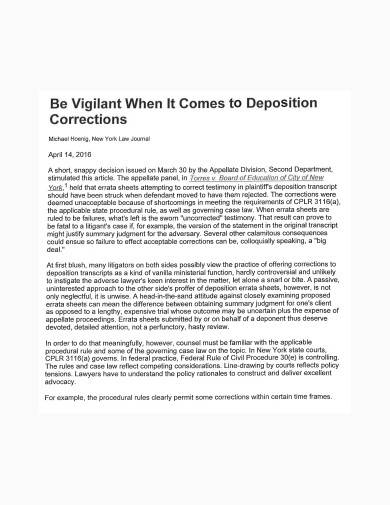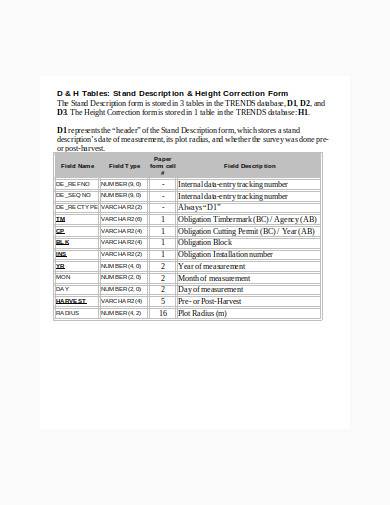If you’re a first-time deponent, you might get worried about possible mistakes and errors that you may provide to a lawyer. But, what if there’s really an error in the deposition recorded by the opposing party? Then, you should contact your lawyer and inform him about it right away! Along with that, a deposition correction form will also be one of the documents that you must expect to sign or fill out. Wondering what this is? Then read on to learn more about this vital document.
Deposition Correction Form: What Is It?
Depositions should be, at all times, accurate and honest statements of the chosen witness or the deponent. Most often, there’d be a legal videographer who will take a video of the meeting between the deponent, his lawyer, the opposing party’s representative, and the court recorder. It’s also crucial that the deponent speaks his answers instead of merely gesturing them by nodding, shaking his head, or using his hands. This is so the court recorder will be able to document every answer in a legal transcript. Once the meeting is over, the transcript and the video will all be submitted to the court to serve as evidence for the trial. However, all parties must know that changing a deposition is not easy. Why? Because there is a legal procedure including the need to file a correction form.
Basically, the purpose of a deposition correction form is to document what changes the deponent or the witness wants to implement into his previous deposition. The contents of the correction should include the page and line number of the deponent’s statement, which is for correction, and the date when the deponent requested the changes. On the one hand, if there is no deposition correction form, the deponent’s claims and statement changes will become invalid, regardless of how true it is.
Tips for Using and Making Deposition Correction Forms
Any document that the court will use will be a legal document that can either win or lose a case trial, and that includes a deposition correction form. So, if a deponent will be changing what he stated before, then he should be aware of the procedure to take. Corrections and affidavits are often not welcomed in some courts as they see it as errata sheets, especially when the deponent gives no reason for his change of mind. That’s why, if you’re the deponent or the lawyer who will be submitting the corrections, then you better take note of the following tips below:
Tip #1: Request for the deposition transcript.
You, as an involved party of a case trial, are eligible to have your own copy of the legal deposition transcript. You can also always request for it if you have misplaced or lost your copy. And, the reason why you need to have the transcript is for you to be able to know and specify which part of it you will be implementing or suggesting some changes. The page number, line number, specific statement, and the changes that you want to have will all be necessary to indicate in your correction form.
Tip #2: Focus on your changes and reasons.
The changes that you will be suggesting may receive a critical response and can become invalid if you don’t provide enough reason about it. So, make sure that the changes are relevant to the case, and are not made up for you to prove that you are no making it up, or had been coerced by anyone to make the changes.
Tip #3: Review the contents of your deposition correction form.
Before you send the form to the court to file a correction order, you must first review and check if there are any mistakes. You don’t want to send another form to correct the ones that you corrected, right? So, be vigilant when it comes to filling out, making, and sending your deposition corrections.
2+ Deposition Correction Forms and Samples in PDF | DOC
Don’t have any idea on what should a deposition correction form look like? Then go through our samples below so you can use it as a guide in making the correction form that you need:
1. Deposition Correction Sample
2. Deposition Correction Template
3. Deposition Correction Form in DOC
Deposition Correction Form: FAQs
What are some examples of areas which can be easily corrected with a deposition correction form?
Although sending a correction to court can be difficult and may affect the case trial, there are some corrections that are easy to validate and are accepted immediately. Some examples include typo or misspelled terms and minor transcript errors. On the one hand, entire witness statements can become extremely challenging to request for a change.
Are there advantages and downsides in filing and submitting a deposition correction form?
Honesty is important in court, but so is accuracy. That’s why when a legal witness waives, denies, and changes his deposition statements, and files the correction or a change form, then he should be aware of possible skeptics and side-eyes. Why? Because it’s human nature to doubt what a person claimed, yet when questioned, he will claim the total opposite. Nonetheless, there’s also an advantage in sending the correction. In specific, the court will be able to arrive at a reasonable resolution to a case trial, primarily if new evidence will be gathered due to the presentation off the changes.
Attorneys and lawyers who will be holding a deposition meeting with a witness should know what they must do. In specific, the American Bar Association had suggested tips on their website, including the need for attorneys to outline their questions before going to the meeting. This allows them to have ample preparation and to gather more information. And, on the side of the deponents, thinking before speaking anything to answer questions is a requirement. This ensures that only relevant answers will be given.
Overall, deposition correction forms are vital for achieving accuracy in the details and evidence to use in court. But, users of such document and their lawyers should provide enough proof and reasonable explanations about why the changes are essential and must be considered.
Related Posts
Background Check Form - 7+ Download Free Documents In PDF ...
9+ Free Sample Short-Form Agreements - PDF
9+ Sample Employee Uniform Forms - Word, PDF
Sample Contact Form - 8+ Documents in PDF, Word
14+ Medical History Forms - Free Sample, Example, Format
Sample Purchase Order Request Form -8+ Examples in Word, PDF
Sample Direct Deposit Authorization Form - 7+ Download Free ...
Sample Reference Request Form - 10+ Examples in Word, PDF
7+ Employee Self-Assessment Samples - Examples in Word, PDF
FREE 18+ Self-Evaluation Form Samples & Templates in PDF Word
Sample Bill of Lading Form - 8+ Examples in Word, PDF
Sample Software Evaluation
Employee Suggestion Form Sample - 8+ Examples in Word, PDF
Sample Corrective Action Plan Template - 14+ Documents in PDF ...
Sample Name Change Form - 10+ Examples in Word, PDF



